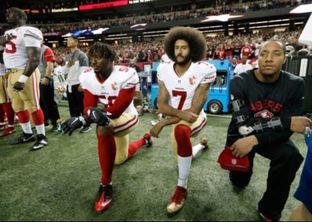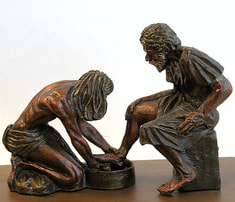 Read most of it below, listen to the whole sermon at: http://www.huntingdonstonechurch.org/sermons/kneeling-october-1-2017 ...Peter is shocked as Jesus kneels to wash his feet, Peter doesn’t understand what Jesus is up to, but he surrenders to the water. Can you relate? Not sure what it all means, uncomfortable, and still we show up for the basin, we surrender to the water, warm on our ankles. We marvel at the hands that caress our soles. We twinge when someone kneels at our feet. We, too, kneel. Other than love feast, when do we kneel? We kneel with humility to recognize the greatness in another person. We kneel with humility as we propose marriage. We kneel with humility when we ask for forgiveness. We kneel with humility to pray. At least that’s what I’ve seen in movies – we don’t have kings or lords to kneel in front of these days, but it makes for great TV, a posture of submission, defenseless, offering one’s head to the king knowing he could draw his sword! And I’ve never seen someone kneel to ask forgiveness in real life either, but maybe some of you have? Maybe you kneel in humility to pray, not usually at Stone, but you would be welcome to – if you can find a way to do it in those pews. Perhaps kneeling in submission and humility is a habit we’ve lost, and is metaphorical more often than literal for most of us. We do kneel with power as we teach a child to tie her shoes. We kneel with power when we help an aging parent out of the car. We kneel with power when we leash our dog for a walk. We kneel with power when we plant seeds and participate in new life. And of course there is humility in trusting the genius of seed, soil and sun. There is power in asking for forgiveness. There is humility in journeying with the very young and very old, giving to the vulnerable what they cannot give to themselves. How often do humility and power live intertwined? Feetwashing is a visceral act of both power and humility. The mainstream western world fails to notice this nuance, seeing the powerful and the humble as two groups living far apart from each other. Jesus tells us that “the first shall be last and the last shall be first” and “blessed are the meek, for they will inherit the earth.” Jesus raises the “last,” the meek, women, slaves – yet Jesus reminds us that servants are not greater than their masters. Jesus tells Peter, the rock upon which he will build his church, “if you love me, feed my sheep.” What could be more humble than sheep?.... Mary is at Jesus’ feet in both of the stories recorded of their encounters. She sits at his feet in Luke 10 to listen to his teachings, and here in John 12 she sits at his feet to anoint and bathe them, and dry them with her hair. Mary uses tradition to break tradition. It was appropriate for her to be at Jesus’ feet and to wash them in hospitality as his inferior. But Mary sits at Jesus’ feet to listen to his teachings. She leaves the kitchen to sit at Jesus’ feet in a roomful of men. Mary comes to Jesus’ feet again to anoint them. As a woman clearly ahead of her time, she might have refused to participate in this ceremony of subordination. Rather, Mary, knowing that she has a precious gift to offer, transforms the ritual itself. Mary brings new meaning to feetwashing – she reclaims this space at a man’s feet in service to equality. When Mary anoints Jesus’ feet, she demonstrates that she is a true disciple, listening better to Jesus than the 12 men who follow him from town to town. Mary, unlike the disciples, acknowledges Jesus’ impending death and anoints him as one soon to be buried. Mary listens when Jesus predicts his death, and she knows something about death. Mary waited for Jesus to come while she watched her own brother die. She faced death when she prepared Lazarus’ body for burial. When Mary kneels at Jesus’ feet her own heart has been broken by death. Mary does not flinch, but faces Jesus’ own death with compassion. She makes a place for his grief and pain. Did anyone see my sermon title and wonder if you’d hear about football this morning? Kneeling is in the scripture for today – I didn’t pick this Philippians passage because I wanted to preach on taking a knee. Look at the back of your bulletin, at the bottom. This scripture was chosen for today long before Colin Kaepernick first kneeled during the national anthem. So here we are. Most of us have a strong reaction, positive or negative, to football players kneeling during the national anthem. The president’s comments last week muddied the waters for a lot of people who initially didn’t like it. One of the gifts Kaepernick has given many young people is the chance to talk about power and responsibility, risk and protest. Even before Trump’s threats against NFL players, young football players on college, high school and even pee wee teams talked about taking a knee, what the symbolism might mean to them, the encounters they’ve had with police. Football teams are more integrated between black and white people than most parts of our society, so I imagine empathy growing through conversations that might never have happened anywhere else because race and racism are two of the hardest things to talk about in the US. That’s my prayer. Some of that teambuilding and empathy growing has happened on Juniata’s football team, which includes sons of police officers and sons of families in Baltimore and Philadelphia that experience police brutality. I asked Stone member and football coach Tim Launtz about how all this taking a knee has gone for his team. His first priority is to support and respect his players, including any witness they choose. Tim also hopes his team is a nurturing environment for players to have open discussion even about these emotional, complex topics. That may be the greatest good we can pray for now, that open discussion, trust and wisdom be nurtured through our words and actions. Because only time will tell what taking a knee will mean. When a crowd of men, many dressed as Mohawk Indians, poured tea over the sides of three ships in Boston Harbor, the British government declared it an “intolerable act” and many colonists (future Americans) argued about whether or not the merchants should be paid for the tea, whether the action was too violent. One historian says the Boston Tea Party or “destruction of the tea” as it was known at the time, didn’t make into mainstream accounts of the American Revolution for decades because it embarrassed the historians.[1] If someone asked me about the American Revolution I’d probably start with the tea, with no taxation without representation!  Today even most white Americans consider Rosa Parks a hero, as far as I can tell. But in 1955 most people wrote her off as causing too much trouble. Newspaper stories discussed how much money the bus company was losing, painting them as the victim in the story. Some Americans granted that discrimination was probably wrong, but why take it out on the bus company? There’s the message of a protest, and then there’s the medium. There’s nothing inherently offensive about tea – the message of the protest was tax resistance, the medium was the tea. The message of the boycott was integration, the medium was city buses. Last August Colin Kaepernick sat during the national anthem and ever since he’s been saying that the message of his protest is accountability for the killing of unarmed black men, the anthem is the medium. Military veteran and NFL player Nate Boyer wrote an open letter to Kaepernick, about watching him sit, “I thought about how far I’d come and the men I’d fought alongside who didn’t make it back. I thought about those overseas who were risking their lives at that very moment. I selfishly thought about what I had sacrificed to get to where I was…I’m not judging you for standing up for what you believe in. It’s your inalienable right. What you are doing takes a lot of courage, and I’d be lying if I said I knew what it was like to walk around in your shoes. I’ve never had to deal with prejudice because of the color of my skin, and for me to say I can relate to what you’ve gone through is as ignorant as someone who’s never been in a combat zone telling me they understand what it’s like to go to war.” Then Kaepernick and Boyer met in person and Boyer said, “We sorta came to a middle ground where he would take a knee alongside his teammate. Soldiers take a knee in front of a fallen brother’s grave, you know, to show respect.”[2] For the rest of the season Kaepernick and other players kneeled during the anthem. However this football seasons’ anthems unfold, it is holy, it is of God, that these men opened us the hurt of their lives to one another, that they grew in empathy and wisdom. All in the public eye, which must be exhausting and downright scary with all the death threats Kaepernick has received. Even as a rich, famous athlete Kaepernick is vulnerable as a black man in this country. NBA superstar LeBron James told us the same thing this summer when someone spraypainted a racist slur on his home. “No matter how much money you have, no matter how famous you are, no matter how many people admire you, being black in America is tough,” he said. “We got a long way to go for us as a society and for us as African Americans until we feel equal in America.”[3] These athletes have more money than any of us, but how much power do they have? Physical power, for now, wealth, for now, influence. But underneath the spraypaint and the death threats and the outrage at taking a knee how many fans see black men as mere entertainment, but not whole people? Kaepernick decided to sit for the anthem by himself (as far as I know). Then he discerned with teammates, with Boyer, with others, as he kneeled throughout the season. Rosa Parks sat alone on that bus, but her witness was planned by committees of people over months. The Boston Tea Party was a group effort. Coach Tim Launtz encourages his players to be thoughtful about any witness they choose (or choose to avoid), not to do something because it's popular but because they really believe in the statement. Sometimes it seems to take forever, but we make better decisions when we discern together. Did Mary and Jesus have confidants, committees, teammates, as they decided to kneel? Kneeling was controversial when Mary and Jesus did it 2000 years ago and controversial today. Our scripture from Paul’s letter to the Philippians references two kinds of kneeling – Jesus taking the form of a slave to serve others, and followers of Jesus kneeling to honor his name. If Jesus Christ is Lord, not the NFL or your bank balance or primetime TV or Republicans or Democrats or this country or any country, what does that mean for your life? “Do nothing from selfish ambition or conceit, but in humility regard others as better than yourselves. Let each of you look not to your own interests, but to the interests of others. Let the same mind be in you that was in Christ Jesus….” I struggled with this while writing this sermon. I want to convince you to agree with me about taking a knee, to join my side on what’s right and what’s wrong. I have some great arguments and had to keep deleting them from my manuscript.[4] That’s not what sermons are for – but I’d love to talk with you later – no matter what you think about taking a knee. Return to the scripture: “look not to your own interests, but to the interests of others. Let the same mind be in you that was in Christ Jesus.” Seeking the mind of Christ. It is not a neutral mind – Jesus took a stand on all sorts of issues. Jesus protested the Sabbath rules by gleaning and healing on the Sabbath. He confronted religious authority and disrupted commerce at the Temple. He knelt as a slave, to serve his friends in love. When he kneels he is humble and powerful all at once. As we wash another’s feet we demonstrate our ability to clean and serve another. As our feet are washed, we demonstrate our vulnerability and need to be served and cleaned. Jesus empowers each of us, acknowledging that each of us has both ability and vulnerability. Like Jesus, we kneel and wash another. Like Jesus, we receive the service another offers when she washes our feet. Like Peter, we are embarrassed and alarmed when someone kneels before us. Like Peter, we learn to trust the ritual, even though we don’t understand the depths of its meaning and reach of its power. Most of us in this room are relatively privileged when it comes to wealth, education, citizenship, and for some, gender, ethnicity, sexual orientation and physical ability. As powerful people with many privileges, serving others isn’t only a way to use our social, financial or knowledge power. Serving is a way to make use of our privilege, but it is also a way to tap into the truest power within each of us – a power deeper than privilege. The truest, deepest power we have is the power of the Divine within us. Jesus knelt, cleansed and healed with his divine power. He asks us to do the same for each other. Kneeling to wash another’s feet is not something we do in a spirit of charity, nor is it something we do in deference to the other. We kneel in a spirit of mutual vulnerability and ability. In the other ways we serve one another – as teachers, mentors, penpals, poets, case workers, lovers, parents, friends, cashiers, baristas, therapists – how can we draw on this divine power in order to serve one another in the spirit of feetwashing? How can we draw from our vulnerability and ability as we foster relationships drenched in mutuality? Draw on the treasures of your faith heritage: the audacity and keen hearing of Mary, the earnest companionship of Peter the rock, and the divine power of Jesus, who kneels and asks us to love one another. [1] https://en.wikipedia.org/wiki/Boston_Tea_Party Young, Alfred [2] http://www.snopes.com/veteran-kaepernick-take-a-knee-anthem/ [3] http://edition.cnn.com/2017/05/31/sport/lebron-james-racist-graffiti-incident/index.html [4] But you can read some: http://www.cnn.com/2017/09/25/us/nfl-national-anthem-trump-kaepernick-history-trnd/index.html
0 Comments
Leave a Reply. |
Archives
January 2022
|

 RSS Feed
RSS Feed